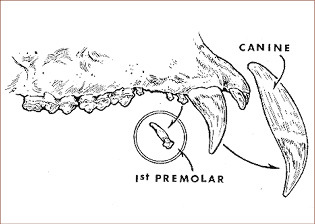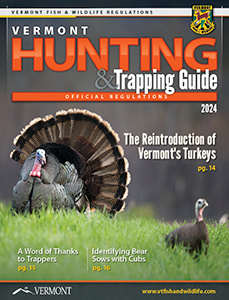Bear Hunting
Vermont has an abundant bear population. Bears can be found all over the state except the Champlain Islands. Your hunting license comes with a “late season bear tag” good from the first day of the regular November deer season through the second Sunday of the regular November deer season. An “early season tag” for September 1 through the day before the first day of the regular November deer season may be purchased separately (hunting license required).
Hunting bears over bait is prohibited. Bear dogs may be used with a permit, but no commercial guiding is allowed with bear dogs.
Some of the best bear hunting occurs in September and October when you can stalk bears by finding concentrated food sources near prime bear habitat. Early in the season, preferred foods include berries, cherries, and standing corn. As the season progresses, wild apples, beechnuts and acorns become more important. Stalking bears in a stand of nut-rich beech trees half way up a mountain on a crisp October morning is one of hunting’s most exciting challenges. The reward is also great-tasting, nutritious meat. When properly prepared, bear meat compares favorably to pork.
General Bear Hunting Seasons—
Early Season: Sept. 1 – Nov. 15, 2024
Late Season: Nov. 16 – 24, 2024
- An early season tag is required from September 1 through the day before the first day of the regular November deer season.
- A hunter may take one black bear in a calendar year.
- Bears may not be taken alive.
- Bears may not be trapped.
- Hunters may not use bait or a baited area to take a bear. A “baited area” is defined as an area where any animal, vegetable, fruit, mineral matter, honey, or any other substance capable of luring or attracting bear has been placed or deposited.
- It is illegal to shoot a bear that is visiting a bird feeder.
- It is illegal to feed bears, even when not hunting for them.
- We recommend that you do not shoot a bear with cubs.
Hunting Hours
Hunting hours are one-half hour before sunrise to one-half hour after sunset. (See Sunset/Sunrise Table)
Archery Hunting
In addition to a hunting license, a bear hunter using a bow or crossbow must have a previous or current bow license or a certificate proving completion of a bow hunter education course.
Tagging Bear
Bear must be tagged immediately when taken. The tag must be placed on the carcass open to view and remain there until the carcass is cut up for consumption.
Reporting Bear
A person taking bear shall within 48 hours report the taking and exhibit the carcass to the nearest game warden, official Vermont Fish & Wildlife Department Reporting Station, or to a person designated by the commissioner to receive the reports.
A person who takes a bear shall collect a premolar tooth from the bear and submit it to a game warden, official Vermont Fish & Wildlife Reporting Station, or to a person designated by the commissioner to receive it within 30 days of taking the bear.
Any bear taken with the use of dogs must be accompanied by the bear dog permit holder at the time of reporting.
No bear carcass shall be transported out of state without first being reported.
A hunter must take a warden to the kill site of a bear if requested to do so by a warden.
Bears must be field dressed prior to reporting.
Check our Website for any changes in these requirements such as online reporting.
Transporting
A tagged bear may be transported only during the open season and for 20 days thereafter. See also Transporting under Big Game Hunting.
Use of Dogs to Hunt Bear
Permit Required
Any person hunting, pursuing, harvesting, or in any manner involved in the taking of a black bear with the use of dogs must hold a valid Vermont Big Game Hunting License, use only department-registered dogs and have purchased a valid bear tag. In addition, the person hunting, pursuing, harvesting, or in any manner involved in the taking of a black bear with the use of dogs must hold a valid bear dog permit or accompany a bear dog permit holder. The license and permit are also required for training dogs to pursue bear.
Regulations on use of dogs in bear hunting and resident and nonresident bear dog permit applications are available from Vermont Fish & Wildlife or at www.vtfishandwildlife.com.
Nonresident bear hound hunters may not hunt in Vermont until September 15.

How old is that bear?
Black Bear Tooth Collection is Required

The Vermont Fish & Wildlife Department needs your help. Knowing the age of the bears that are harvested by hunters is a very important part of Vermont’s scientific bear management program. A premolar tooth is required by law to be submitted by the hunter from every bear harvested in Vermont.
Removing the bear’s premolar tooth is easy and does not affect the mounting quality of the bear. Visit http://tinyurl.com/BearToothRemoval for a video on removing the pre-molar. Please ask the check station operator for a tooth envelope so you can remove the tooth and seal it in the envelope and deposit it in the green tooth bucket at any check station. Remember to clearly print your name and Conservation ID Number on the envelope. If you don't put it in the check station bucket, you must give it to a warden within 30 days. Every tooth we receive from hunters helps the bear project.
The age of your bear will be available on the department's website in the spring after it is returned from the lab. Thank you.

